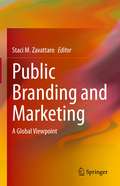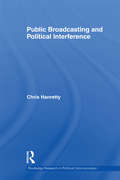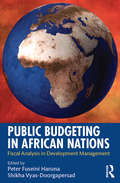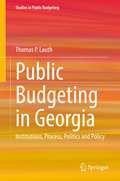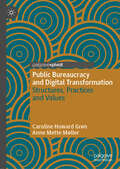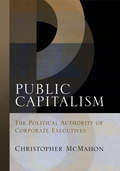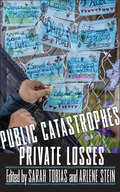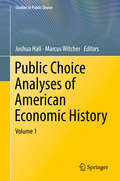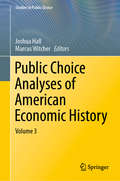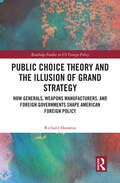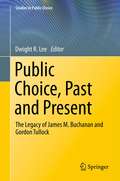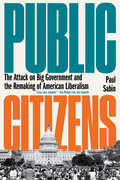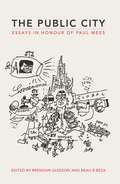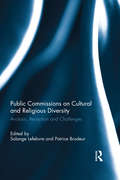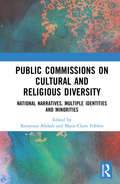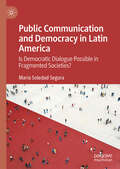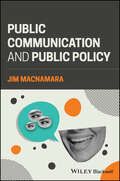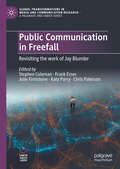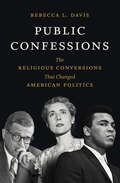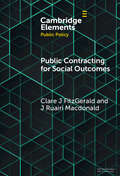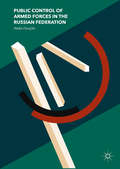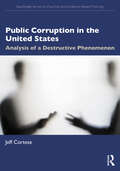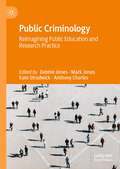- Table View
- List View
Public Branding and Marketing: A Global Viewpoint
by Staci M. ZavattaroThis edited volume details public branding and marketing from a global, comparative perspective. Place branding and marketing practices are now prominent in cities, states, nations, regions, and organizations all over the world. While disciplines such as hospitality management, tourism marketing, and business marketing have made inroads into understanding the intricacies of place branding, research in public administration and policy is still emerging. This volume fills that research gap. Including accounts from both the academic and practitioner communities, this book bridges the academic-practitioner divide and provides a holistic account of branding and marketing in public organizations as well as immediate application and lessons learned. The book takes an explicit public administration approach, focusing on a wide range of topics such as branding leadership, co-creation, stakeholder engagement, education, non-profit marketing and branding, and city administration. The book is divided into four sections. Section I highlights the process of developing and communicating public branding and marketing efforts. Section II focuses specifically on how social media and other digital technologies are used to communicate and evaluate place branding strategies. Section III centers on branding at the local government level. Section IV highlights how various stakeholder groups come together (or not) when participating in strategic branding efforts. Presenting various methodologies, approaches, and implications of place branding and marketing across differing social, cultural, political, and economic conditions, this book will be of use to scholars and students in public. administration, tourism studies, and business administration as well as professionals and practitioners in the public branding and marketing field.
Public Broadcasting and Political Interference (Routledge Research in Political Communication)
by Chris HanrettyPublic broadcasters, like the BBC and the Italian broadcaster RAI, are some of the most important media organisations in the world. Politicians are often tempted to interfere in the workings of these broadcasters and when this happens, the results are highly controversial, as both the Blair and Berlusconi governments have discovered. Public Broadcasting and Political Interference explains why some broadcasters are good at resisting politicians’ attempts at interference, and have won a reputation for independence – and why other broadcasters have failed to do the same. It takes a comparative approach of broadcasters in different countries, including the United Kingdom, Italy, Spain and Sweden arguing political independence for public service broadcasters is important because of its contribution to democracy allowing voters alternative sources of information which allow them to choose between electoral alternatives. The book will be of interest to be of interest to policy-makers, scholars and students of political communication, broadcasting and the media.
Public Budgeting in African Nations: Fiscal Analysis in Development Management
by Peter Fuseini Haruna Shikha Vyas-DoorgapersadPublic Budgeting in African Nations aims to provide usable budgeting and fiscal policy management information to development practitioners interested in improving the performance of governments in the context of good governance. It shares regional and cross-cultural experiences with international audiences and gives reflective attention to comparative budgeting and fiscal policy management. With a promising economic and fiscal forecast, such information is timely for international development practitioners and for scholars and researchers interested in advancing development management. This book adopts an interdisciplinary/pragmatic approach to analyze and present research findings on public budgeting as a sustainable development tool. The central argument is that development practice will benefit from a bottom-up, decentralized approach to budgeting and fiscal policy management, involving national, sub-national, and civil society institutions. From this perspective, a balanced budget should draw from and reflect values and priorities across the full spectrum of social and political life.
Public Budgeting in Georgia: Institutions, Process, Politics and Policy (Studies in Public Budgeting)
by Thomas P. LauthThis book describes the institutions and process through which the Georgia General Assembly adopts a budget, the executive-legislative branch politics that transpire during the process and the tax and spending policies that the process produces. It argues that the state’s budget is developed by fiscal conservatives within a culture of fiscal conservatism that is conducive to low taxes and low spending. It identifies the patterns and trends of taxing and spending over several decades and during the administrations of nine governors. Its chapter on the line-item veto illustrates the nature of executive-legislative budget relationships in the state. It concludes with an examination of the important milestones in the evolution of Georgia budgeting and a comparison of Georgia with other states on several dimensions. The book offers insights and assessments that will be of interest to budgeting scholars, students of state government, and citizens who want to know more about how government taxing and spending decisions are made.
Public Bureaucracy and Digital Transformation: Structures, Practices and Values (Governance and Public Management)
by Caroline Howard Grøn Anne Mette MøllerThis book assesses how digitalization of public organizations affects their bureaucratic structure and features. Drawing on rich ethnographic data from two highly digitalized government agencies in Denmark, it analyses how digitalization both enhances and distorts fundamental characteristics of Weberian bureaucracy, including division of labour, hierarchy, rules and programmability, and bureaucratic discretion. The book also examines the ways in which digitalization influences demands on employees’ and managers’ expertise and relationships with other organizational actors, and demonstrates the implications of digitalization for the enactment of public bureaucratic values such as legality, transparency, accountability, and responsiveness. In doing so, it provides an analysis of the opportunities and challenges facing public bureaucracies in the digital age. Above all, the book offers a nuanced understanding of how digital transformation reshapes the public bureaucracy, and thereby one of the foundation stones on which our societies stand.
Public Capital and Growth
by Sanjeev Gupta Fabian Bornhorst Serkan Arslanalp Elsa SzeA report from the International Monetary Fund.
Public Capitalism
by Christopher McmahonIn modern capitalist societies, the executives of large, profit-seeking corporations have the power to shape the collective life of the communities, local and global, in which they operate. Corporate executives issue directives to employees, who are normally prepared to comply with them, and impose penalties such as termination on those who fail to comply. The decisions made by corporate executives also affect people outside the corporation: investors, customers, suppliers, the general public. What can justify authority with such a broad reach? Political philosopher Christopher McMahon argues that the social authority of corporate executives is best understood as a form of political authority. Although corporations are privately owned, they must be managed in a way that promotes the public good.Public Capitalism begins with this claim and explores its implications for issues including corporate property rights, the moral status of corporations, the permissibility of layoffs and plant closings, and the legislative role played by corporate executives. Corporate executives acquire the status of public officials of a certain kind, who can be asked to work toward social goods in addition to prosperity. Public Capitalism sketches a new framework for discussion of the moral and political issues faced by corporate executives.
Public Catastrophes, Private Losses (The Feminist Bookshelf: Ideas for the 21st Century)
by Naomi Klein Marcia Gallo Christina Sharpe Ellen Malenas Ledoux Kathleen C. Riley Basuli Deb Marisa J. Fuentes Carmen Vázquez Michelle Commander Jennifer Flynn Walker Bela August Walker Smruthi Bala Kannan Stacy S. Klein Leslye Amede ObioraFrom COVID to climate-change-induced wildfires and hurricanes, we live in an era when catastrophes have become the new normal. But even though these events affect us all, some members of society are more vulnerable to harm than others. This essay collection explores how the definition of catastrophe might be expanded to include many forms of large-scale structural violence on communities, species, and ecosystems. Using feminist methodologies, the contributors to Public Catastrophes, Private Losses trace the connections between seemingly unrelated forms of violence such as structural racism, environmental degradation, and public health crises. In contrast to a news media that focuses on mass fatalities and immediate consequences, these essays call our attention to how catastrophes can also involve slow violence with long-term effects. The authors also consider how these catastrophes are profoundly shaped by government action or inaction, offering a powerful critique of how government neglect has cost lives and demonstrating how vulnerable populations can be better protected. The essays in this collection examine how public catastrophes imprint themselves on lives, as individuals and communities narrate, process, and grapple with legacies of loss. The book is thus a feminist intervention that challenges the binary between public and private, personal and political.
Public Choice Analyses of American Economic History: Volume 1 (Studies in Public Choice #35)
by Joshua Hall Marcus WitcherThis book - the first of two volumes- looks at episodes in American economic history from a public choice perspective. Each chapter discusses citizens, special interests, and government officials responding to economic incentives in both markets and politics. In doing so, the book provides fresh insights into important periods of American history, from the Acadian expulsion in 1755 to the allocation of government grants during the New Deal. This volume features the work of prominent economic historians such as Dora Costa, John Wallis, and Jeremy Atack; well-known public choice scholars such as Jac Heckelman; and younger scholars such as Vincent Geloso and Philip Magness. This book will be useful for researchers and students interested in economics, history, political science, economic history, public choice, and political economy.
Public Choice Analyses of American Economic History: Volume 3 (Studies in Public Choice #39)
by Joshua Hall Marcus WitcherThis book is the third installment in a series of volumes looking at episodes in American economic history from a public choice perspective. Each chapter discusses citizens, special interests, and government officials responding to economic incentives in both markets and politics. In doing so, the book provides fresh insights into important periods of American history, from the Rhode Island’s 1788 Referendum on the U.S. Constitution and the political influence of women’s clubs in the United States. The volume features economic historians such as Ruth Wallis Herndon, junior public choice scholars such as Jayme Lemke and Leo Krasnozhon, and political scientists such as Michael Faber. This volume will be useful for researchers and students interested in economics, history, political science, economic history, public choice, and political economy.
Public Choice III
by Dennis C. MuellerThis book represents a considerable revision and expansion of Public Choice II (1989). Six new chapters have been added, and several chapters from the previous edition have been extensively revised. The discussion of empirical work in public choice has been greatly expanded. As in the previous editions, all of the major topics of public choice are covered. These include: why the state exists, voting rules, federalism, the theory of clubs, two-party and multiparty electoral systems, rent seeking, bureaucracy, interest groups, dictatorship, the size of government, voter participation, and political business cycles. Normative issues in public choice are also examined including a normative analysis of the simple majority rule, Bergson-Samuelson social welfare functions, the Arrow and Sen impossibility theorems, Rawls's social contract theory and the constitutional political economy of Buchanan and Tullock.
Public Choice Theory and the Illusion of Grand Strategy: How Generals, Weapons Manufacturers, and Foreign Governments Shape American Foreign Policy (Routledge Studies in US Foreign Policy)
by Richard HananiaThis book argues that while the US president makes foreign policy decisions based largely on political pressures, it is concentrated interests that shape the incentive structures in which he and other top officials operate. The author identifies three groups most likely to be influential: government contractors, the national security bureaucracy, and foreign governments. This book shows that the public choice perspective is superior to a theory of grand strategy in explaining the most important aspects of American foreign policy, including the war on terror, policy toward China, and the distribution of US forces abroad. Arguing that American leaders are selected to respond to public opinion, not necessarily according to their ability to formulate and execute long-terms plans, the author shows how mass attitudes are easily malleable in the domain of foreign affairs due to ignorance with regard to the topic, the secrecy that surrounds national security issues, the inherent complexity of the issues involved, and most importantly, clear cases of concentrated interests. The book will be of interest to students and scholars of American Studies, Foreign Policy Analysis and Global Governance.
Public Choice, Past and Present
by Dwight R. LeeIn 1962, economists James M. Buchanan and Gordon Tullock published The Calculus of Consent, in which they developed the principles of public choice theory. In the fifty years since its publication, the book has defined the field and set the standard for research and analysis. To celebrate a half-century of scholarship in public choice, Dwight Lee has assembled distinguished academics from around the world to reflect on the influence of this monumental publication, and, more broadly, the legacy of its legendary authors. Their essays cover a broad spectrum of topics and approaches, from the impact of public choice theory on foreign policy analysis to personal remembrances of learning from and collaborating with Buchanan and Tullock. The result is a unique collection of insights that celebrate public choice and its visionary proponents, while considering its future directions.
Public Citizens: The Attack On Big Government And The Remaking Of American Liberalism
by Paul Sabin“Crisp, clear, eloquent.” –Kim Phillips-Fein, New Republic An “elegantly argued and meticulously documented” (Timothy Noah, New York Times Book Review) account of the postwar struggle over the proper role of citizens and government in American society. In the 1960s and 1970s, an insurgent attack on traditional liberalism took shape in America. It was built on new ideals of citizen advocacy and the public interest. Environmentalists, social critics, and consumer advocates like Rachel Carson, Jane Jacobs, and Ralph Nader crusaded against what they saw as a misguided and often corrupt government. Drawing energy from civil rights protests and opposition to the Vietnam War, the new citizens’ movement drew legions of followers and scored major victories. Citizen advocates disrupted government plans for urban highways and new hydroelectric dams and got Congress to pass tough legislation to protect clean air and clean water. They helped lead a revolution in safety that forced companies and governments to better protect consumers and workers from dangerous products and hazardous work conditions. And yet, in the process, citizen advocates also helped to undermine big government liberalism—the powerful alliance between government, business, and labor that dominated the United States politically in the decades following the New Deal and World War II. Public interest advocates exposed that alliance’s secret bargains and unintended consequences. They showed how government power often was used to advance private interests rather than restrain them. In the process of attacking government for its failings and its dangers, the public interest movement struggled to replace traditional liberalism with a new approach to governing. The citizen critique of government power instead helped clear the way for their antagonists: Reagan-era conservatives seeking to slash regulations and enrich corporations. Public Citizens traces the history of the public interest movement and explores its tangled legacy, showing the ways in which American liberalism has been at war with itself. The book forces us to reckon with the challenges of regaining our faith in government’s ability to advance the common good.
Public City: Essays in Honour of Paul Mees
by Brendan Gleeson Beau B BezaPaul Mees' urban ideal counted on watchful, confident and well-informed citizenry to work collectively in a quest for fair and just cities. As such, The Public City is largely a critique of neo-liberalism and its arguably negative influence on urban prospects. As Mees explained it, neo-liberal urbanism was much more than a political aberration; it was a threat that imposed many costly failures in an age overshadowed by grave ecological challenges.Fifteen of Australia and New Zealand's leading urban scholars, including Professor Emeritus Jean Hillier and Professor Brendan Gleeson, have contributed to this collection.The Public City includes a foreword by the late Professor Sir Peter Hall, a world leader in urban planning from Britain. Kenneth Davidson, one of Australia's top economic columnists, has also contributed a chapter. The collective works in this book extend beyond an analysis of urban patterns to provide a blueprint for the improvement of civic and institutional purpose in the creation of the public city.
Public Commissions on Cultural and Religious Diversity: Analysis, Reception and Challenges
by Solange Lefebvre Patrice BrodeurDue to growing negative perceptions about relations between historically entrenched, dominant populations and various minority groups, issues relating to the need to better manage cultural and religious diversity have been intensifying in many countries. These negative perceptions have recently led to a significant increase in popular support for right and extreme right nationalist discourses, and have created so much public tension that national governments have had no choice but to respond. In the last two decades, in several Western contexts in particular, the issues raised by such combined challenges have culminated in the creation of government-initiated or private national commissions. This book presents the results of a multidisciplinary analysis, from a broader framework that includes the national public commissions which have addressed the challenges of managing cultural and religious diversity in Belgium, Britain, Canada (Quebec), France, Morocco and Norway (including also other cases of public management in Australia and Singapore). It includes in-depth studies of the issues and controversies examined by each of the commissions, such as the ways they perceived the issues, their results and impact, the key political players involved, the media debates and reception surrounding each commission, the communication strategies and difficulties their leaders encountered, as well as the legal aspects each commission has raised. The reports represent a rich body of work charting the fundamental questions nations face about their nature, history and future while the impact on peoples’ lives tells us much about different approaches to the issues of cultural identity between countries.
Public Commissions on Cultural and Religious Diversity: National Narratives, Multiple Identities and Minorities
by Marie-Claire Foblets Katayoun AlidadiIn several Western countries, expert commissions composed of academics, public figures, politicians and community organisers have been established by governments or civil society to reflect on the changes and challenges of an increasingly plural society. Commission recommendations on how to ‘manage’ diversities successfully have shaped national narratives and affected law and public policies, yet research on the workings of such commissions remains rare. This book focuses on the experiences of expert commissions in the UK, France, Quebec and Belgium. Furthering the debate on commissions’ potential and limitations it draws on the first-hand experiences and introspection of former commission members and close observers, along with outside perspectives and critique from independent scholars. Building on its companion volume (Public Commissions on Cultural and Religious Diversity: Analysis, Reception and Challenges), this book engages with core concepts of identity, nationality, citizenship, freedom, equality and accommodation. It will appeal to researchers and students of public policy, sociology, anthropology, law, religion, politics, history and migration studies, as well as policymakers and anyone with a general interest in current debates on ethnic, cultural and religious diversity.
Public Communication and Democracy in Latin America : Is Democratic Dialogue Possible in Fragmented Societies?
by María Soledad SeguraThe book examines alternatives proposed and implemented by governments, civil society organizations, social movements and companies in Latin America to democratize public communication and overcome its current problems, such as the dissemination of alternative facts and fake news, anti-scientific discourse, harassing, discriminatory and hate speech, anti-human rights and anti-democracy discourses, and the contempt for political correctness. Drawing on theoretical approaches from media and communication, political studies and sociology, the book identifies strengths and weaknesses of the strategies for promoting democratic dialogue in Latin America and globally.
Public Communication and Public Policy: Reviving Democracy by Recalibrating Public Communication
by Jim MacnamaraAn invaluable resource for shaping policies that resonate with the public and benefit democratic practices Democracy may be widespread, but its vitality is under siege. Public trust in governments and institutions has eroded to critical levels, with many democracies failing to include citizens in meaningful consultation, engagement, and participation. Public Communication and Public Policy: Reviving Democracy addresses this urgent need, exposing how one-way communication practices perpetuate disengagement and hinder policy effectiveness. Drawing on research across three continents, author Jim Macnamara dissects policy frameworks and government communication guidelines to uncover systemic shortcomings and offer actionable solutions. Combining critical literature reviews, practitioner interviews, and real-world case studies, Public Communication and Public Policy delivers detailed recommendations to reform public communication—challenging conventional approaches and advocating for recalibrated consultation and citizen participation to rebuild trust and reinvigorate democratic processes. A timely, solutions-focused analysis of democratic challenges, Public Communication and Public Policy Analyzes 16 widely used policy models to reveal critical gaps in consultation and engagement practices Provides detailed strategies to enhance public communication, consultation, and stakeholder participation Introduces groundbreaking frameworks such as the IP-IT model of communication Examines key policy failures such as Robodebt (Australia) and Post Office Horizon (UK) Bridges communication theory, public policy studies, and political science Public Communication and Public Policy: Reviving Democracy by Recalibrating Consultation, Engagement, Participation, and Government Communication is a must-read for academics, students, and professionals in public communication, strategic communication, and public policy. It is particularly relevant for policymakers, advisers, and government communication practitioners aiming to create inclusive, effective, and trust-building policies.
Public Communication in Freefall: Revisiting the work of Jay Blumler (Global Transformations in Media and Communication Research - A Palgrave and IAMCR Series)
by Stephen Coleman Frank Esser Katy Parry Julie Firmstone Chris PatersonThis book addresses key challenges facing global political communication at a time in which transformations in political practice, media ecology and cultural expectations both threaten traditional democratic norms and point to potential new ways of enacting political democracy. Drawing upon the outstanding theoretical insights of Jay Blumler to our understanding of the norms and practices of political communication, but also critically interrogating and updating them where appropriate, the volume asks timely questions about what publicness and democracy mean in the 2020s. Many people are talking and writing about the crisis of political democracy, fewer are talking about the role of the media in relation to that crisis. While many scholars have responded in an ad hoc way to the various crises of populism, polarisation, mis and disinformation, this book shows how Jay Blumler’s scholarship provides us with the tools and framework to research and understand the changing communication environment systemically and rigorously. The book demonstrates the applicability and relevance of Blumler’s work in explicating the current crisis of communication and the need for fresh and radical thinking in tackling it. The book's breadth and depth of chapters from a broad range of scholars from the East and West, ranging from long-standing contributors to the field to those in the early stages of their career, combine to produce a thoughtful and provocative invitation to reflect upon the concept of a ‘crisis of public communication’. We expect this book to become a major source for political communication students and scholars.
Public Confessions: The Religious Conversions That Changed American Politics
by Rebecca L. DavisPersonal reinvention is a core part of the human condition. Yet in the mid-twentieth century, certain private religious choices became lightning rods for public outrage and debate. Public Confessions reveals the controversial religious conversions that shaped modern America. Rebecca L. Davis explains why the new faiths of notable figures including Clare Boothe Luce, Whittaker Chambers, Sammy Davis Jr., Marilyn Monroe, Muhammad Ali, Chuck Colson, and others riveted the American public. Unconventional religious choices charted new ways of declaring an "authentic" identity amid escalating Cold War fears of brainwashing and coercion. Facing pressure to celebrate a specific vision of Americanism, these converts variously attracted and repelled members of the American public. Whether the act of changing religions was viewed as selfish, reckless, or even unpatriotic, it provoked controversies that ultimately transformed American politics.Public Confessions takes intimate history to its widest relevance, and in so doing, makes you see yourself in both the private and public stories it tells.
Public Contracting for Social Outcomes (Elements in Public Policy)
by Clare J. FitzGerald J. Ruairi MacdonaldGovernments all over the world have transitioned away from directly providing public services to contracting and collaborating with cross-sectoral networks to deliver services on their behalf. Governments have thus pursued an array of policy instruments to improve interorganizational progress towards policy goals. In recent years, outcomes-based contracting has emerged as a compelling solution to service quality shortcomings and collective action challenges. Informed by public policy, public administration, and public procurement scholarship, this Element details the evolution of social outcomes in public contracting, exploring the relationship between how outcomes are specified and managed and how well such instruments deliver against policy goals. It comments on the possible drawbacks of contracting for social outcomes, highlighting how governments may use outcomes as an excuse to avoid actively managing contracts or to sidestep their accountability as outlined in public law. This title is also available as Open Access on Cambridge Core.
Public Control of Armed Forces in the Russian Federation
by Nadja DouglasThe volume deals with the fundamentals of the contemporary relations between civic actors and state power structures. The main focus lies on public control of armed forces and the question of why civilians should have a vigilant eye on the military institution as well as the civilian authority that legitimizes the use of force. Based on the example of conscription and recruitment as an intersection between the military and society, this study engages in an analysis of institutional change in the politico-military field in post-Soviet Russia. Taking a critical stance on conventional military sociology, the book shifts the focus away from the exclusive power relationship between political and military elites in the context of national security. Instead, it takes into consideration human and societal security, i. e. the needs and demands of individuals and groups at the grassroots level, affected by the military and the prevailing security situation in Russia. The book addresses readers with an interest in civil-military relations, contemporary Russian affairs, and social movement theories.
Public Corruption in the United States: Analysis of a Destructive Phenomenon (Routledge Series on Practical and Evidence-Based Policing)
by Jeff CortesePublic Corruption in the United States provides a comprehensive view of public corruption, including discussion on its types, methods, trends, challenges, and overall impact. It is the first book of its kind to examine in plain language the breadth of criminal public corruption in the United States, not just at a superficial level, but in a deeper context. By critically examining acts of corruption of elected, appointed and hired government officials (legislators, law enforcement, judges, etc.) at the local, state, and federal levels, the reader gains insight into the inner workings of corruption, including its relationship to terrorism and organized criminal networks. Using simple language and easy-to-understand examples, this book is about empowering investigators, compliance professionals, educators, public officials, and everyday citizens who seek to better serve, support, and protect their communities and their country.
Public Criminology: Reimagining Public Education and Research Practice
by Anthony Charles Mark Jones Debbie Jones Kate StrudwickThis book discusses the role and impact of ‘Public Criminology’. It brings together a collection of key scholars who have been at the fore of empirical and practice work in relation to understanding how ‘Public Criminology’ can engender academic activism. Split into two parts, it focusses on academic activism and research methodologies, and public criminology and pedagogical practice. It includes chapters on a range of topics including Inside-Out teaching, it discusses the role of social scientists and stepping outside of established research practices, and how students, the public and children can be engaged in criminological learning and issues to become agents of social change. It includes a reflection on how ‘Public Criminology’ has developed both in the UK and USA. It speaks to students, researchers and academics alike involved in teaching and learning within the discipline of Criminology and those who wish to evaluate practice and ensure their interventions have impact on commissioners and policymakers.
